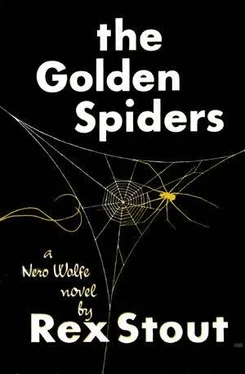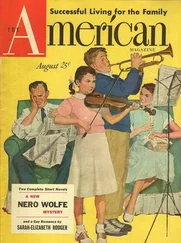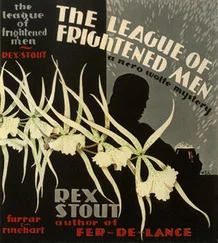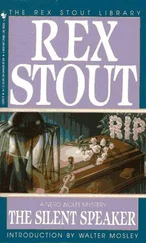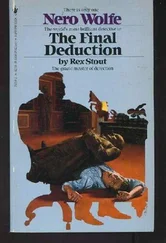“Enough,” Cramer growled.
“Of course. I don’t decry it. Such lines of inquiry often get you an answer, but manifestly in this case they haven’t even hinted at one or you wouldn’t be here. Would I find in your dossier the answer to this question: Why did the man who killed the boy in broad daylight, with people around on the street, dare to run the risk of later identification by one or more onlookers? Or to this one: How to account for the log of the earrings — bought by Mrs. Fromm on May eleventh, worn by another woman on May nineteenth, and worn by Mrs. Fromm on May twenty-second? Have you found any trace of the earrings beyond that? Worn by anyone at any time?”
“No.”
“So I have provided my own answers, but since I can’t expound them without naming my candidate, that will have to wait. Meanwhile—”
He halted because the door to the hall was opening. It swung halfway, enough for Fred Durkin to slip past the edge and signal to me to come.
I arose, but Wolfe asked him, “What is it, Fred?”
“A message for Archie from Saul.”
“Deliver it. We’re sharing everything with Mr. Cramer.”
“Yes, sir. Horan wants to speak with you. Now. Urgent.”
“Does he know Mr. Cramer and Mr. Stebbins are here?”
“No, sir.”
Wolfe went to Cramer. “This man Horan is a hyena, and he irritates me. I should think you would prefer to deal with him on your own premises — and also the other two. Why don’t you take them?”
Cramer regarded him. He took the cigar from his mouth, held it half a minute, and put it back between his teeth. “I would have thought,” he said, not positively, “that I have seen you work all the dodges there are, but this is new. I’m damned if I get it. You had Horan and that lawyer Maddox here, and you chased them. The same with Paul Kuffner. Now Horan and the other two, there in your front room, and you don’t even want to see them, and still you claim you’re after the murderer. I know you too well to ask you why, but by God I’d like to find out.” He swiveled his head around to Fred. “Bring Horan in here.”
Fred, not moving, looked at Wolfe. Wolfe heaved a sigh. “All right, Fred.”
For a second I thought Dennis Horan was actually going to turn and scoot. He came wheeling in like a man with a purpose, stopped short when he saw we had company, forward marched four steps, recognized Cramer, and stopped short again. That was when I thought he was going to skedaddle.
“Oh,” he said. “I don’t want to butt in.”
“Not at all,” Cramer assured him. “Sit down. We were just talking about you. If you’ve got something to say, go right ahead. I’ve been told how you happen to be here.”
Considering the atmosphere and circumstances, including the hard night he had been through, Horan did pretty well. He had to make a snap decision whether to make any change in his program because of the unexpected presence of the law, and apparently he managed it while he was placing a chair between Stebbins and Cramer and putting himself on it. Seated, he glanced from Cramer to Wolfe and back to Cramer.
“I’m glad you’re here,” he said.
“So am I,” Cramer rumbled.
“Because,” Horan went on, “you may feel that I owe you an apology, though I may not agree.” The tenor was down a couple of notches. “You may think I should have told you about a talk I had Friday evening with Mrs. Fromm.”
Cramer was giving him a hard eye. “You have told us about it.”
“Yes, but not all of it. I had to make an extremely difficult decision, and I thought I made it right, but now I’m not so sure. Mrs. Fromm had told me something that might prove damaging to the Association for the Aid of Displaced Persons if it were made public. She was the president of the Association, and I was its counsel, and therefore what she told me was a privileged communication. Ordinarily, of course, it is improper for an attorney to divulge such a communication, but I had to decide whether this was a case where the public interest prevails. I decided that the Association had a right to rely on my discretion.”
“I think the record will show that you gave no indication that you were withholding anything.”
“I suppose it will,” Horan conceded. “Possibly I even stated I had told you all that was said that evening, but you know how that is.” He thought he would smile and then thought he wouldn’t. “I had made a decision, that’s all, and now I think it was wrong. At least I now want to reverse it. After dinner that evening Mrs. Fromm took me aside and told me something that shocked me greatly. She said she had received information that someone connected with the Association was furnishing names of people illegally in this country to a blackmailer, or a blackmail ring, and that the people were being persecuted; that the blackmailer, or the head of the ring, had been a man named Matthew Birch, who had been murdered Tuesday night; that a man named Egan was involved in it; and that—”
“Aren’t you Egan’s attorney?” Cramer demanded.
“No. That was a mistake. I acted on impulse. I’ve thought it over, and I’ve told him I can’t act for him. Mrs. Fromm also told me that the meeting place of the blackmailers was a garage on Tenth Avenue — she gave me its name and address. She wanted me to go there at midnight that night, Friday. She said there was a pushbutton on the second pillar to the left in the garage, and I should give a signal with it, two short, one long, and one short, and then go to the rear and down a stair to the basement. She left it to me how to proceed with whomever I might find there, but she impressed on me that the main thing was to prevent any scandal that would injure the Association. That was like her! Thinking always of others, never of herself.”
He paused, evidently momentarily overcome. Cramer asked, “Did you go?”
“You know I didn’t, Inspector. As my wife and I have told you, after I took Mrs. Fromm down to her car I returned to my apartment and went to bed. I had told Mrs. Fromm that I would think it over. I would probably have decided to go the next night, Saturday, but in the morning the news came of Mrs. Fromm’s death, and that terrible shock—” Horan had to pause again.
He resumed. “Frankly, I was hoping that you would find the murderer, and that there would be no connection between the crime and the affairs of the Association. So I didn’t tell you of that talk. But Sunday came and went, and Monday, and I began to fear that I had made a mistake. Last evening I decided to try something. Around midnight I drove to that garage, drove right in, and there on the second pillar found the pushbutton. I pressed it, giving the signal as Mrs. Fromm had told me, and an answering signal came, a buzzer. As I was starting for the rear a man who had been lurking nearby drew a gun and ordered me to go as he directed. I did so. He took me back to a stair and commanded me to descend. At the foot of the stairs was another man with a gun, whom I recognized — Archie Goodwin.”
He nodded sidewise at me. I didn’t return it. He went on. “I had seen him Saturday evening in this office. While I no longer feared for my own safety, naturally I resented having guns pointed at me, and I protested. Goodwin summoned another man from within a room, also armed, and I was taken across to a wall and held there. I had seen this other man previously. He had called at my office yesterday morning, giving the name of Leopold Heim, and I had—”
“I know,” Cramer said curtly. “Finish the garage.”
“As you wish, Inspector, of course. Before long Goodwin called to this man, calling him Saul, to bring me to the room. There were three other men in there, one obviously with Goodwin, and the other two lying on the floor with their ankles bound. Goodwin said he had telephoned Nero Wolfe, and apologized to me. Then, after he had spoken briefly to the two on the floor, saying they had committed felonies and he was going to take them to Wolfe for questioning, he told one of them, the one he called Egan, that I was a lawyer and I might be willing to represent him. When the man asked me I said I would, and I must confess that that was ill-considered. I explain it, though I don’t ask you to excuse it, by the fact that I was not in proper command of my faculties. I had been ordered around by men with guns, and besides I resented Goodwin’s arbitrary transport of those men to the house of his employer when the proper procedure would have been to notify the authorities. So I agreed, and came here with them, and have been held here all night. I—”
Читать дальше
